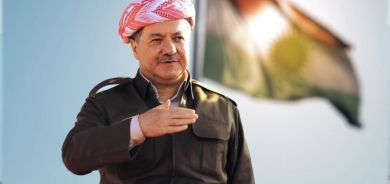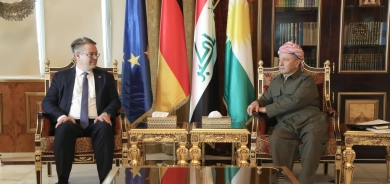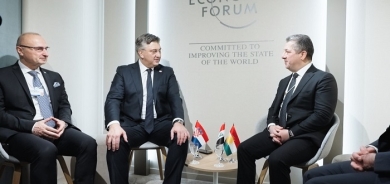PESHMERGA RECAPTURE SHINGAL: PRESIDENT BARZANI VOWS TO PURSUE ISIS ‘WHEREVER THEY ARE’

Then in September and October 2014, ISIS tried to take Kobane, the main city in one of the three autonomous Kurdish cantons in Syria. Once again Kurds from elsewhere, mainly the peshmerga—not just those under immediate attack—joined hands to finally beat back this vicious attack against Kobane. Again a determined US bombing campaign, coordinated with the Syrian Kurds defending Kobane also helped beat back ISIS. However once again Turkey let its ancient fear and hatred of the Kurds trump the ISIS danger and remained inactive, leaving the Kurds to their fate. Surely Turkey will come to regret its inaction.
Although the United States had also long listed the PKK as a terrorist organization, it did not so consider the PYD to whom it delivered aid in Kobane, actions much criticized by Turkey. Since the PYD and PKK are closely associated, implicit in the U.S. support for the PYD is that the United States might come to recognize that the PKK is also no longer a terrorist organization. Such U.S. action would be a disaster for Turkey and might even threaten its NATO membership as Turkey was also denying the United States usage of its strategic airport in Incirlik to support the Kurds fighting for their lives in Kobane. Since Turkey decided not to support its NATO allies in such a basic matter as this, many began to question why Turkey should even remain a member of NATO!
Now as 2014 comes to an end, the KRG has regained Mount Shingal, throwing ISIS back in headlong retreat towards Syria. KRG President Massoud Barzani declared that “It is a dream come true to speak before you here and extend my congratulations to the Kurdish people, to our beloved Yezidis.” The peshmerga had recaptured 2,700 square kilometers of Kurdish territory from ISIS.
Masrour Barzani, the head of KRG’s national security council, declared that “This is the biggest victory against IS since the beginning of the War. We have managed to open a corridor so the people stuck on the mountain can reach safety.” Barzani further explained that 8,000 peshmerga had been involved, joined by the PKK and a local Yezidi group of fighters known as the YBS. Although some Yezidis still remained on Mt. Shingal, the peshmerga had been able to delivered food and supplies to them, and they would soon be evacuated.
Once again the peshmerga had been supported by US airstrikes from the US-led coalition based in Kuwait. Lt. General James L. Terry, the overall commander of this air coalition, announced that more than 50 airstrikes had destroyed ISIS storage units, bulldozers, guard towers, vehicles, and bridges, among other. In addition, the air strikes had killed at least three senior ISIS leaders and thus hurt ISIS’s command capabilities. However, elsewhere in Iraq, anti-ISIS forces were not doing as well. Despite more than 1700 US troops trying to train Baghdad’s forces, they were losing territory in Anbar province. Baiji, the largest oil refinery in Iraq, also had once again been lost to ISIS shortly after it had been recaptured.
What lessons should be drawn from these Kurdish successes? The KRG should remain cautious because ISIS has simply lost a battle, not the war. What may be called “the revenge of the Baathists”—because so many high-ranking ISIS officials in Iraq are former Baathists—will continue. ISIS remains a determined and formidable foe of the Kurds. The defeats and problems ISIS has earlier inflicted on the Kurds, represents a warning to the KRG that it still lives in a dangerous region. The KRG must remain vigilant against renewed ISIS aggression and also cultivate continuing US support. Although successful KRG independence remains the ultimate goal, the Kurds must remember their inherent limitations and continue to play the wise waiting game.
Professor Michael M. Gunter
Tennessee Technological University
USA

 Michael Gunter
Michael Gunter











